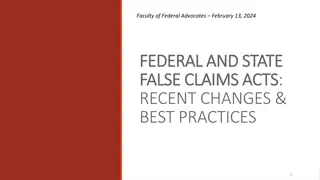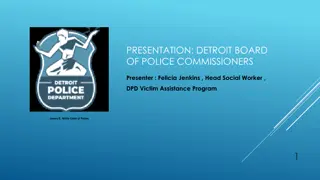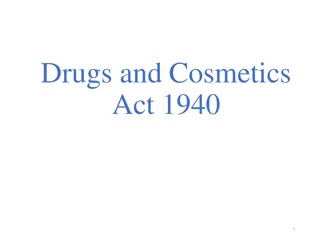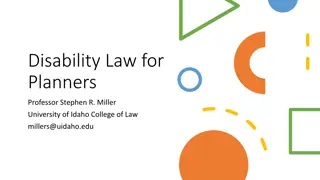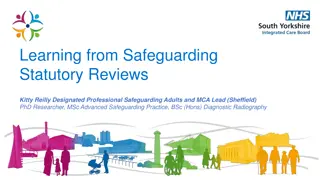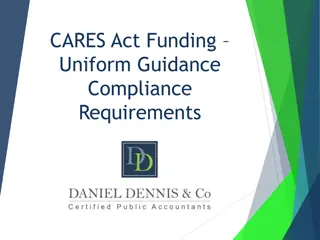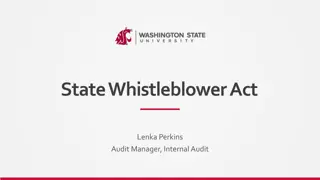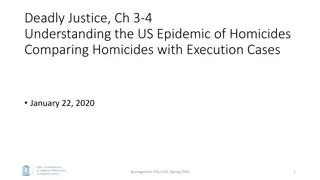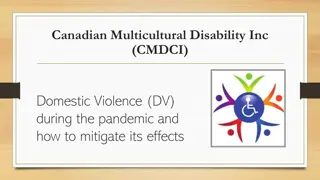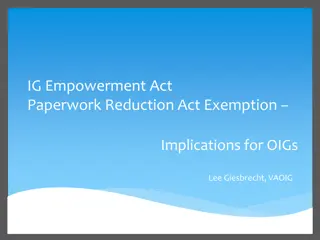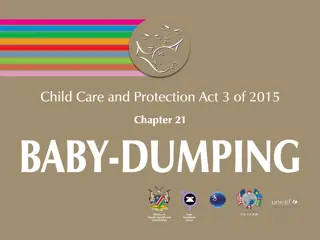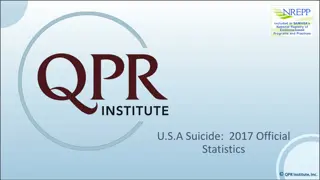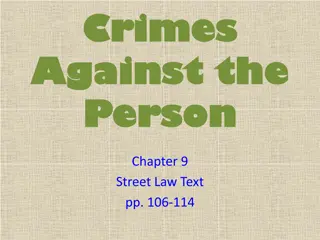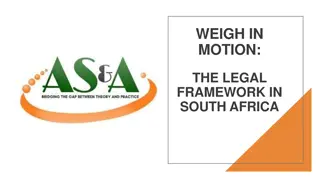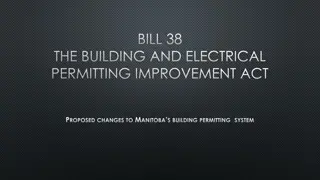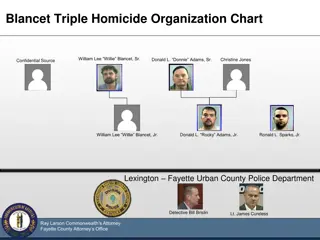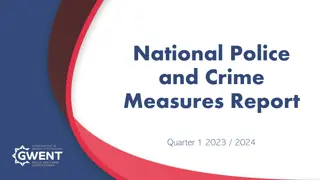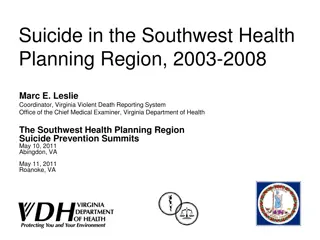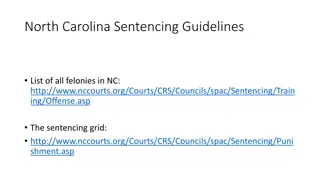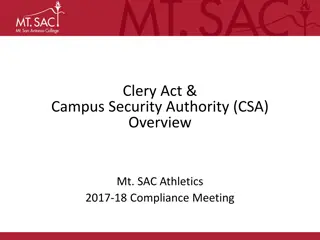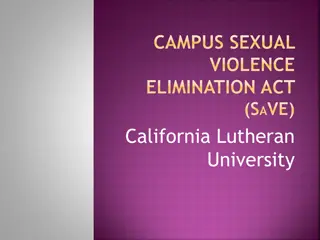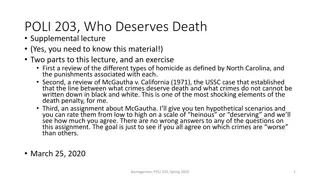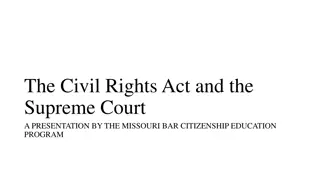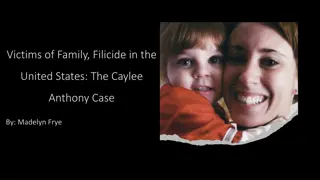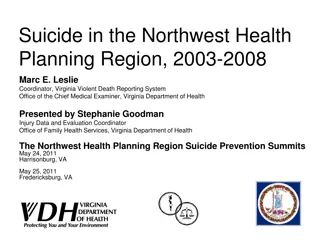United Nations Survey on Crime Trends and Operations of Criminal Justice Systems
The United Nations Survey on Crime Trends and Operations of Criminal Justice Systems (UN-CTS) focuses on harmonizing data collection, identifying crime patterns, improving monitoring of the criminal justice system, and enhancing international comparability of crime statistics. It was mandated by the
3 views • 18 slides
Understanding Colorado False Claims Act: Recent Changes and Best Practices
Colorado False Claims Act (CFCA) mirrors the federal False Claims Act, aiming to safeguard public funds. The act covers various entities and imposes penalties for false claims. Liable defendants face significant damages, including penalties, treble damages, and attorneys' fees. Cooperation can lead
0 views • 13 slides
Detroit Police Victim Assistance Program Overview
Established in 1975 as the Detroit Police Rape Counseling Center, now known as the Victim Assistance Program, the program aims to support individuals in Detroit affected by sexual assault, domestic violence, and homicide. Through a commitment to restoring hope and promoting healing, the program offe
0 views • 14 slides
Purrfect Match Case Study: Solving a Homicide Mystery
Explore the forensic investigation of a homicide case involving Doug Beamish, his wife Shirley Duguay, and a cat named Snowball. Evidence such as blood analysis, hair samples, and DNA matching led to Beamish being charged, convicted, and sentenced to prison for 18 years. Dive into the details of thi
0 views • 6 slides
Overview of Drugs and Cosmetics Act, 1940
The Drugs and Cosmetics Act of 1940 was enacted to regulate the import, manufacture, distribution, and sale of drugs and cosmetics in India. The Act aims to ensure high standards of medical treatment, prevent substandard drugs, and establish advisory boards for different types of drugs. It sets out
0 views • 49 slides
Federal Laws Impacting Disability Accessibility in Housing
This presentation discusses five key federal laws that impact disability accessibility in housing: Americans with Disabilities Act (ADA), Fair Housing Act (FHA), Rehabilitation Act 504 (RHA), Architectural Barriers Act (ABA), and Executive Order 13217. It highlights the requirements and implications
0 views • 21 slides
Understanding The Clery Act for Study Abroad Trips
The Clery Act, signed into law in 1990, mandates certain requirements to ensure campus safety and security, including reporting specific crimes within designated Clery geography. This Act applies to various locations such as on-campus, public property, and non-campus property, impacting study abroad
1 views • 16 slides
Overview of Drugs and Cosmetics Act, 1940 and Its Rules 1945
The Drugs and Cosmetics Act of 1940 and its Rules of 1945 were established to regulate the import, manufacture, distribution, and sale of drugs and cosmetics in India. The Act ensures that only qualified individuals are involved in these processes and aims to prevent the entry of substandard or spur
0 views • 116 slides
Understanding Safeguarding Statutory Reviews and Best Practices
Exploring the importance of learning from safeguarding statutory reviews in various domains such as child practice, safeguarding adults, and domestic homicide reviews. The content discusses the statutory requirements for review processes and the responsibilities of relevant agencies in cases of abus
0 views • 7 slides
Understanding CARES Act Funding Compliance Requirements
CARES Act Funding Compliance Requirements provide guidelines for organizations receiving federal funding under the CARES Act, specifying audit requirements and uniform guidance to ensure financial accountability. This includes details on types of funding, responsibilities of schools and auditors, Ch
0 views • 15 slides
Overview of State Whistleblower Act in Washington State
The State Whistleblower Act in Washington State, governed by the Revised Code of Washington (RCW) 42.40, provides a mechanism for state employees to report improper governmental actions. The Act aims to encourage whistleblowers to come forward, prohibits retaliation, and authorizes remedies for viol
0 views • 28 slides
Understanding the US Homicide Epidemic: A Comparative Analysis
The statistics on homicides and gun-related homicides in the US are derived from death certificates and FBI reports, revealing a concerning trend of violence compared to other OECD countries. Variances in homicide rates by location and demographics are highlighted, with alarming rates in cities like
0 views • 26 slides
Understanding Domestic Violence Trends During the Pandemic
Domestic violence, a serious issue affecting individuals regardless of age, gender, or background, has escalated during the pandemic. This type of violence encompasses various forms such as physical, sexual, emotional, and financial abuse, leading to severe mental, emotional, and spiritual effects o
2 views • 26 slides
Understanding Implications of IG Empowerment Act and Paperwork Reduction Act
The IG Empowerment Act provides beneficial provisions for Inspector Generals (IGs) such as exemptions from certain acts, including the Computer Matching Act and Paperwork Reduction Act. The Paperwork Reduction Act requires federal agencies, including IGs, to obtain OMB clearance before conducting su
1 views • 25 slides
Understanding Baby Dumping and the Child Care and Protection Act of 2015
Baby dumping, the act of abandoning infants, is a serious issue addressed by the Child Care and Protection Act of 2015 in Namibia. This Act provides safe options for anonymously leaving children to prevent harm or death. Abandoned children are placed in temporary care until claimed or available for
0 views • 13 slides
Alarming Statistics and Impact of Suicide in the USA
The statistics from 2017 reveal a concerning rise in suicide rates in the USA, with 47,000 deaths annually attributed to suicide. Every 11 minutes, a suicide occurs, amounting to 129 suicides every day. Young people aged 15-24 are particularly vulnerable, with 6252 deaths reported in 2017. Suicide r
0 views • 10 slides
Understanding Crimes Against the Person: A Comprehensive Overview
Crimes against the person, including homicide, kidnapping, assault, battery, and sexual assault, are among the most serious offenses. These crimes are categorized by their levels of seriousness and intent, such as criminal and non-criminal homicide. Murder, differentiated into first and second-degre
2 views • 19 slides
Understanding the Hatch-Waxman Act: Promoting Affordable Generic Drugs
The Hatch-Waxman Act, also known as The Drug Price Competition and Patent Term Restoration Act, was enacted in 1984 to amend patent laws and the Federal Food, Drug, and Cosmetic Act. It aims to reduce costs associated with generic drug approval, allow early experimental use, compensate branded drug
0 views • 49 slides
Child Death Review Project in Western Cape
The Child Death Review Project presented by Prof. Shanaaz Mathews focuses on child murders in the Western Cape region, aiming to address the high child homicide rates and improve coordination between health, police, and social services to prevent further child deaths. By developing intersectoral res
0 views • 20 slides
Understanding Homicide: Types and Examples
Homicide is the killing of one human being by another, which can be criminal, noncriminal, or negligent. It may involve deliberate intent, malice, premeditation, and different degrees of murder like first and second degree. Examples include cases of first degree murder, second degree murder, and fel
0 views • 27 slides
Understanding Criminal Homicide and Its Classifications
Considered a crime against the person, criminal homicide encompasses various degrees including first-degree murder, second-degree murder, manslaughter, involuntary manslaughter, and negligent homicide. Each degree is characterized by specific elements such as premeditation, malice, intent, and reckl
0 views • 8 slides
Understanding Voluntary Manslaughter and Diminished Responsibility in Criminal Law
Voluntary manslaughter is a legal concept where certain special defenses can reduce a murder charge to manslaughter, giving judges discretion in sentencing. Diminished responsibility, introduced by the Homicide Act, allows individuals suffering from abnormal mental functioning during a killing to ha
0 views • 23 slides
Time Series Analysis and Forecasting for Predicted Homicide Rate in St. Louis
This project aims to locate the best forecasting model to predict the homicide rate for St. Louis in 2015, analyzing historical data to forecast where and how many incidents may occur. Utilizing time series analysis, the objective is to extrapolate patterns and forecast future values based on past d
0 views • 21 slides
Legal Framework for Weigh-In Motion in South Africa
The legal framework in South Africa regarding weigh-in motion involves various acts and guidelines that impact the weighing of vehicles, such as the Trade Metrology Act, Legal Metrology Act, and National Road Traffic Act. The laws govern the requirements for mass measuring, equipment specifications,
0 views • 22 slides
Proposed Changes to Manitoba's Building Permitting System
Bill 38, "The Building and Electrical Permitting Improvement Act," introduces the Permit Dispute Resolution Act in Manitoba. This act allows for appeals to an adjudicator regarding building code compliance and performance standards under the Buildings Act. The adjudicator can confirm, vary, or set a
1 views • 6 slides
Investigation of Blancet Triple Homicide Organization Chart and Key Individuals
Detailed organization chart involving William Lee Blancet, Sr., Donald L. Donnie Adams, Sr., and others in the Blancet Triple Homicide case, including key individuals like Detective Bill Brislin, Lt. James Cureless, and Ray Larson from the Commonwealth's Attorney's Office. The chart provides crucial
0 views • 9 slides
Gwent Police Crime Reduction Strategies Report Q1 2023/2024
Gwent Police is implementing various strategies to reduce homicide, serious violence, and drug-related crimes. Initiatives include a three-year Homicide Prevention Strategy, Serious Violence prevention plan, and efforts to disrupt drug supply. The focus is on early intervention, prevention, and part
0 views • 7 slides
Analysis of Suicide Trends in Southwest Health Planning Region (2003-2008)
This presentation explores data on suicide rates in the Southwest Health Planning Region from 2003 to 2008. It covers the average number of suicides per year, the demographics of suicide victims, the methods used in suicides, and a comparison with homicide rates. The visuals depict the number of sui
0 views • 75 slides
Insights on Homicide, Domestic Violence, Youth, and Guns in Memphis
This presentation delves into research findings on homicide, domestic violence, youth, and guns in Memphis, conducted in collaboration with various agencies. The study examines homicide trends, including geographic concentrations and juvenile involvement, shedding light on critical issues impacting
0 views • 27 slides
Understanding the Uniform Power of Attorney Act and Hawaii Act 22
Explore the significance of the Uniform Power of Attorney Act and Hawaii Act 22 regarding Powers of Attorney, termination of agent's authority, general powers granted, and more. Learn about the legal document granting authority to act on behalf of a principal and the termination clauses that may be
0 views • 22 slides
Colonial Challenges Under British Rule
In this academic material, students are instructed to update the Table of Contents and engage with resources related to tighter British control over the colonies. The tasks include exploring historical events like the Proclamation Act of 1763, Quartering Act, Sugar Act, Stamp Act, Declaratory Act, a
0 views • 18 slides
Analysis of Sentencing Guidelines for Felonies and Homicide in North Carolina
Explore North Carolina's sentencing guidelines for felonies and different types of homicide, including punishments for crimes such as first-degree murder, manslaughter, and assault. Delve into a ranking exercise to assess which crimes may be perceived as most deserving of the death penalty based on
0 views • 14 slides
Understanding the Clery Act and Campus Security Authority (CSA)
The Clery Act, named after Jeanne Clery who was tragically murdered, requires higher education institutions to report crime statistics. Campus Security Authorities (CSAs) play a vital role in collecting and sharing this data to ensure student safety. CSAs include individuals with campus security res
0 views • 14 slides
Data Act Reporting and Financial Management Overview
The Digital Accountability and Transparency Act (DATA Act) of 2014 aims to enhance transparency in federal expenditures. It directs the government to standardize and publish various financial reports and data compilations related to obligations, spending, payments, budget actions, procurement, and a
0 views • 16 slides
Campus Sexual Violence Elimination Act (SAVE) at California Lutheran University
Campus Sexual Violence Elimination Act (SAVE) was passed in March 2013 as part of the Violence Against Women Reauthorization Act, impacting institutions of higher education like California Lutheran University (CLU). The act mandates CLU to educate its community on prevention/awareness of sexual viol
0 views • 22 slides
Cross-National & Cross-Cultural Risk Factors for Offending
Explore key risk factors for offending across nations & cultures, analyzing homicide rates, structural differences, individual/family factors, and the generalizability of crime risk factors. Learn about findings related to impulsivity, achievement, conduct problems, family supervision, parenting sty
0 views • 13 slides
Understanding Types of Homicide and Punishments in North Carolina
Explore different types of homicide as defined by North Carolina, along with the associated punishments. Dive into the complexities of determining crimes deserving death penalty, as seen in McGautha v. California (1971), and participate in exercises to gauge perspectives on heinous crimes. Learn abo
0 views • 20 slides
The Civil Rights Act of 1964 and the Supreme Court
In the 1960s, Congress passed the Civil Rights Act of 1964, a pivotal legislation that prohibited discrimination in public accommodations. This act represented a significant shift in focus towards minority rights. The Supreme Court's past rulings on the Civil Rights Act of 1875 influenced Congress t
0 views • 24 slides
Understanding Filicide: The Impact and Prevention
Filicide, the act of parents killing their children, is a tragic reality with significant societal implications. In the United States, about 2.5% of all homicide arrests involve filicide cases, with various risk factors identified. Media portrayal of filicide cases can deeply influence public percep
0 views • 7 slides
Analysis of Suicide in the Northwest Health Planning Region (2003-2008)
The presentation discusses suicide data in the Northwest Health Planning Region from 2003 to 2008. It covers the number of suicides per year, suicide rates, comparison with homicide rates, demographics of suicide victims, and key findings from the region. Various statistics and visuals provide insig
0 views • 74 slides

